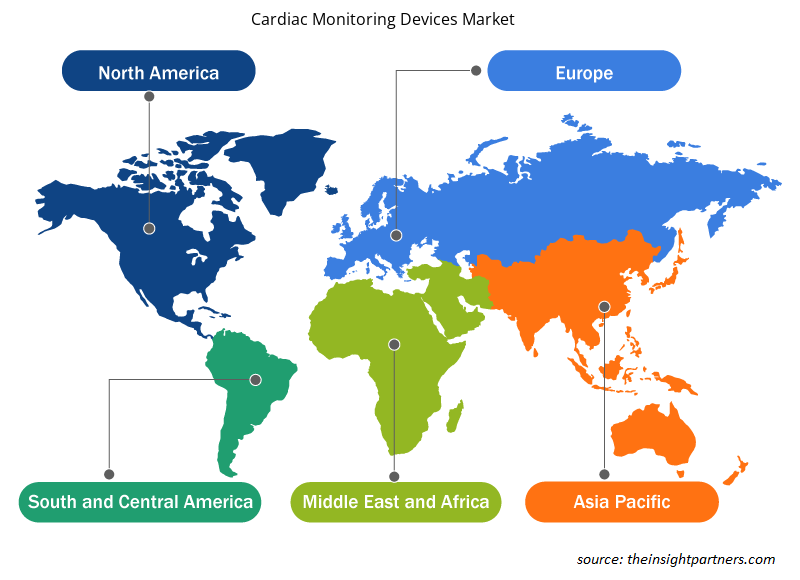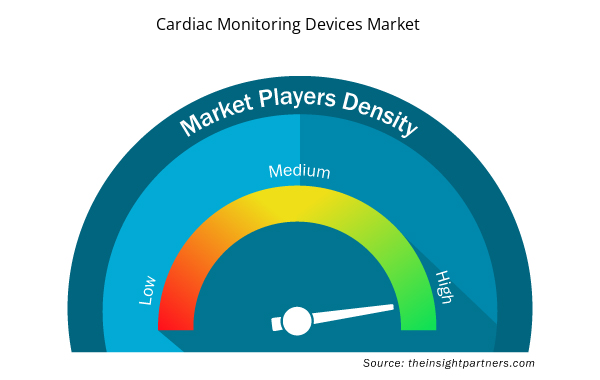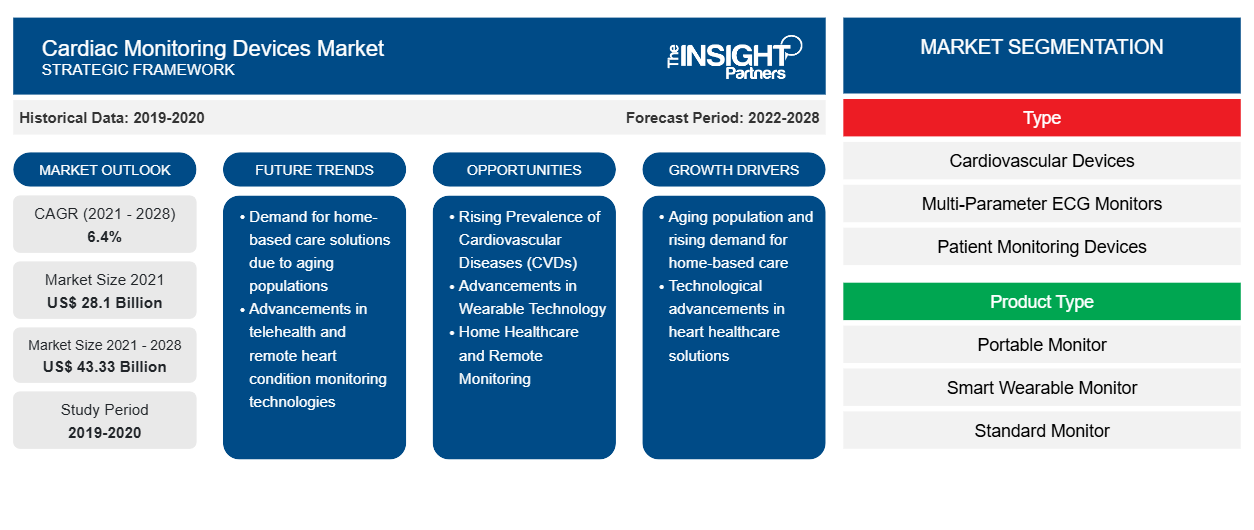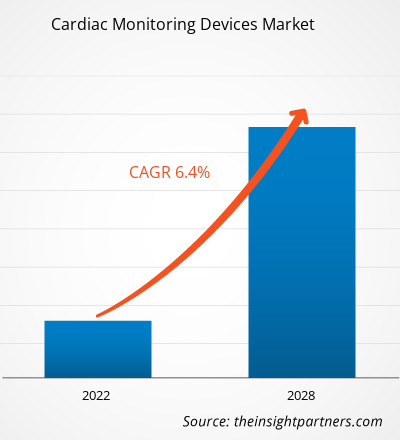[研究报告] 心脏监测设备市场预计将从 2021 年的 280.9808 亿美元增至 2028 年的 433.3436 亿美元;预计 2021 年至 2028 年的复合年增长率为 6.4%。
心脏事件监测器是一种用于记录心脏电活动 (ECG) 并跟踪心跳和心律的设备。当需要长期监测并非每天发生的症状时,可使用心脏事件监测器。使用心脏监测设备可以跟踪、记录重要的心脏健康数据并将其发送给患者的医生,从而减少频繁就诊的需要,让护理团队能够远程监测患者的心脏健康状况。
全球心脏监测设备市场根据类型、产品类型、应用、最终用户和地理位置进行分析。根据地理位置,心脏监测设备市场大致分为北美、欧洲、亚太地区、中东和非洲 (MEA) 以及南美洲和中美洲。该报告对心脏监测设备市场进行了深入分析,强调了市场趋势、技术进步和市场动态等参数,并分析了全球心脏监测设备市场中世界领先市场参与者的竞争格局。
定制此报告以满足您的需求
您可以免费定制任何报告,包括本报告的部分内容、国家级分析、Excel 数据包,以及为初创企业和大学提供优惠和折扣
- 获取此报告的关键市场趋势。这个免费样品将包括数据分析,从市场趋势到估计和预测。
市场洞察
心血管疾病发病率上升推动全球心脏监测设备市场增长
在过去的十年中,世界各地见证了心脏监测设备的显著发展,为医生和患者提供了治疗多种疾病的新方法,包括房性心律失常、室性心律失常和室性心房颤动。冠心病、心脏骤停、先天性心脏病、心力衰竭、肺动脉高压和肺动脉压(PA)等心血管疾病 (CVD) 的发病率不断上升,这促使人们不断改进监测方法。使用简单和能够快速检测心血管疾病 (CVD) 是心脏监测设备普及的因素。根据世界卫生组织 (WHO) 的数据,每年约有 3000 万人中风。此外,美国心脏协会指出,预计到 2035 年,美国将有超过 1.3 亿人患有心血管疾病。
世界卫生组织估计,每年有 1790 万人死于心血管疾病,占全球报告死亡总数的 32%。心血管疾病的主要风险因素包括家族史、种族和年龄;其他风险因素包括吸烟、高血压、肥胖、高胆固醇、缺乏运动、糖尿病、不健康饮食和饮酒。此外,生活方式的改变导致糖尿病、高血压、血脂异常和肥胖的增加,导致全球心血管疾病病例激增。大多数心血管疾病病例可以通过主动监测和早期诊断来预防,这增加了对心脏监测设备的需求。因此,心血管疾病发病率的增加推动了全球心脏监测设备市场的增长。
产品发布和批准数量的增加对全球心脏监测设备市场的增长做出了重大贡献。
全球心脏监测设备市场的特点是规模大小公司众多。为了增加市场份额,市场参与者采取了各种策略,如新产品发布、区域扩张和技术进步。随着持续的创新和技术进步,心脏监测设备比以往任何时候都更安全、更有效,从而提高了心脏监测设备的接受度。领先的参与者正在投资研发以开发先进技术并获得更多收入份额。
以下是与全球心脏监测设备市场相关的一些最新发展:
- 2021 年 5 月,美敦力公司宣布在美国商业推出 SonarMed 气道监测系统。SonarMed 气道监测系统使用声学技术检查气管插管 (ETT) 是否阻塞并实时确认位置,为医生提供重要信息,从而为患者做出更明智、更挽救生命的决定。
- 2021 年 7 月,美敦力公司宣布美国食品药品监督管理局 (FDA) 批准两种使用 LINQ II 可植入心脏监护仪 (ICM) 的 AccuRhythm AI 算法。AccuRhythm AI 将人工智能 (AI) 应用于 LINQ II 收集的心律事件数据,以提高医生收到的信息的准确性,从而更好地诊断和治疗异常心律。
- 2021 年 7 月,雅培宣布在美国推出其最新的植入式心脏监护仪 (ICM) Jot Dx。借助 Jot Dx ICM,医生和医院可以查看所有异常心律数据,或使用“关键事件”选项通过简化记录的心律失常节律的独特功能来通知。该技术可以远程检测患者的心律失常并提高诊断准确性。Jot Dx ICM 使用 SyncUP,这是一种个性化服务,可提供定制的教育和培训,以帮助患者连接到 ICM 并保持连接。
- 2022 年 1 月,MicroPort CRM 的最新植入式起搏器 Alizea 获得了日本监管机构 PMDA 的批准。这些设备采用蓝牙技术,与 MicroPort CRM 已在日本获得批准的 SmartView Connect 家用监视器结合使用,可实现优化的远程监控。
- 2021年6月,深圳市凯威尔电子有限公司推出新款心电平板电脑NeoEC GT180和NeoECGS120。Neo ECG通过支持与AIECG平台的连接,使医院和医疗中心能够进行智能诊断。
市场参与者积极参与产品创新和开发以及产品审批的增加将推动未来几年全球心脏监测设备市场的增长。
类型洞察
根据类型,全球心脏监测设备市场细分为心血管设备、多参数心电图监测器、患者监测设备、动态心脏监测和心脏监测器。2020 年,心血管设备细分市场占据了最大的市场份额。然而,预计患者监测设备细分市场的复合年增长率将在 2021 年至 2028 年期间达到最高。随着中风、冠心病、心脏骤停、先天性心脏病和其他心血管疾病等慢性疾病的增多,患者监测设备的需求也在增加。温度监测、持续血糖监测和脉搏血氧饱和度血压监测是可穿戴患者监测、生物传感器和智能植入物的几种应用。对生命体征监测器的需求激增正在推动这一细分市场的发展。
产品类型洞察
根据产品类型,全球心脏监测设备市场细分为便携式监测器、智能可穿戴监测器和标准监测器。2020 年,标准监测器细分市场占据了最大的市场份额。此外,智能可穿戴监测器细分市场的市场预计将在 2021 年至 2028 年期间以最高的复合年增长率增长。PMMA 是一种具有优异机械性能和最小毒性的塑料。技术进步渗透到我们的日常生活中,日益增长的趋势鼓励使用商业智能可穿戴监测器进行健康管理。在 COVID-19 大流行催化的远程、日益个性化的患者护理时代,心血管社区对可穿戴技术的需求及其广泛的临床应用提出了要求。对智能可穿戴监测器的需求激增正在推动这一细分市场的增长。
应用程序洞察
根据应用,全球心脏监测设备市场细分为冠心病、心脏骤停、中风、心律失常、先天性心脏病、心力衰竭、肺动脉高压、心脏功能 (HF/LVEDP)、肺动脉压 (PA) 等。冠心病细分市场在 2020 年占据了最大的市场份额,预计到 2028 年将成为市场的最大股东。糖尿病、高血压和胆固醇等慢性病的全球患病率高且死亡率增加,增加了患心血管疾病的风险,从而加速了冠心病病例的数量。
最终用途洞察
根据最终用户,全球心脏监测设备市场分为医院、门诊手术中心 (ASC) 和诊所。医院部门在 2020 年占据了最大的市场份额,预计到 2028 年将成为市场的最大股东。这些部门的增长归因于心血管疾病病例的增加。医院是主要的医疗保健中心,在这里可以广泛治疗冠心病、中风、心脏骤停、心律失常等心血管疾病,从而促进了这一部门的增长。
产品发布和并购是全球心脏监测设备市场参与者最常采用的策略。以下列出了一些近期的关键产品开发:
- 2021年7月,雅培在美国市场推出了Jot Dx可插入式心脏监护仪,用于检测心律不齐。
- 2021年7月,两种用于LINQ II可植入心脏监护仪(ICM)的AccuRhythm AI算法获得美国食品药品监督管理局(FDA)(ICM)批准。AccuRhythm AI利用人工智能(AI)提高LINQ II获取的心律事件数据的准确性,使医生能够更好地诊断和治疗异常心律。
COVID-19 疫情引发了对在家接受急诊科 (ED) 治疗的患者进行临床恶化监测(例如低氧血症)的需求,以帮助提高医院的容量。住院患者面临未被发现的临床恶化风险,因为患者数量增加,再加上所有医生工作量人员配备比例高。疫情加速了基于患者需求和风险的监测和治疗,技术进步、医疗紧迫性和支付政策的结合支持了这一变化。COVID-19 疫情标志着远程患者监测 (RPM) 心脏管理新时代的开始。基于可穿戴医疗设备的实时心血管疾病监测可有效降低 COVID 19 死亡率。COVID 19 疫情加速了全球心脏监测设备的实施。由于许多市场参与者批准和推出的产品数量增加,预计预测期内对心脏监测设备的需求将持续增长。因此,COVID-19 疫情对心脏监测设备市场产生了重大的积极影响。
心脏监测设备市场区域洞察
Insight Partners 的分析师已详尽解释了预测期内影响心脏监测设备市场的区域趋势和因素。本节还讨论了北美、欧洲、亚太地区、中东和非洲以及南美和中美洲的心脏监测设备市场细分和地理位置。

- 获取心脏监测设备市场的区域特定数据
心脏监测设备市场报告范围
| 报告属性 | 细节 |
|---|---|
| 2021 年市场规模 | 281亿美元 |
| 2028 年市场规模 | 433.3亿美元 |
| 全球复合年增长率(2021 - 2028) | 6.4% |
| 史料 | 2019-2020 |
| 预测期 | 2022-2028 |
| 涵盖的领域 | 按类型
|
| 覆盖地区和国家 | 北美
|
| 市场领导者和主要公司简介 |
|
市场参与者密度:了解其对商业动态的影响
心脏监测设备市场正在快速增长,这得益于终端用户需求的不断增长,而这些需求又源于消费者偏好的不断变化、技术进步以及对产品优势的认识不断提高等因素。随着需求的增加,企业正在扩大其产品范围,进行创新以满足消费者的需求,并利用新兴趋势,从而进一步推动市场增长。
市场参与者密度是指在特定市场或行业内运营的企业或公司的分布情况。它表明在给定市场空间中,相对于其规模或总市场价值,有多少竞争对手(市场参与者)存在。
在心脏监测设备市场运营的主要公司有:
- 美敦力
- 雅培
- 波士顿科学公司
- iRhythm 技术公司
- 通用电气医疗
免责声明:上面列出的公司没有按照任何特定顺序排列。

- 了解心脏监测设备市场的主要参与者概况
心脏监测设备——市场细分
心脏监测设备 - 按类型
- 心血管设备
- 事件监视器
- 心电图 (ECG)
- 心导管
- 支架
- 除颤器
- 导丝
- 起搏器
- 心脏瓣膜
- 其他的
- 病人监护设备
- 心脏监测设备
- 麻醉监测设备
- 血液动力学监测设备
- 胎儿和新生儿监测设备
- 压力管理设备
- 负荷超声心动图
- 跑步机压力测试
- 心肌灌注 PET 压力测试
- 核压力测试 (SPECT)
- 其他的
- 多参数心电图监测仪
- 心脏监护仪
- 心脏事件监测 (CEM)
- 动态心电图
- 扩展动态心电图/动态心电图
- 其他的
- 动态心脏监测
- 事件记录器
- 植入式循环录音机
- 移动心脏遥测
- 其他的
- 其他的
心脏监测设备 -
按产品类型
- 标准监视器
- 便携式显示器
- 智能穿戴监测仪
心脏监测设备 -
按应用
- 冠心病
- 中风
- 心脏骤停
- 心律失常
- 心脏衰竭
- 肺动脉高压
- 先天性心脏病
- 肺动脉压(PA)
- 心脏功能 (HF/LVEDP)
- 其他的
心脏监测设备 -
按最终用户
- 医院
- 诊所
- 门诊手术中心
- 心脏中心
- 家庭护理
- 其他的
心脏监测设备 -
按地理位置
- 北美
- 我们
- 加拿大
- 墨西哥
- 欧洲
- 法国
- 德国
- 英国
- 意大利
- 西班牙
- 欧洲其他地区
- 亚太地区 (APAC)
- 中国
- 日本
- 印度
- 澳大利亚
- 韩国
- 亚太其他地区
- 中东和非洲 (MEA)
- 沙特阿拉伯
- 南非
- 阿联酋
- 中东和非洲其他地区
- 南美洲和中美洲(SCAM)
- 巴西
- 阿根廷
- 南美洲和中美洲其他地区
公司简介
- 美敦力
- 雅培
- 波士顿科学公司
- iRhythm 技术公司
- 通用电气医疗
- Biotronik 公司
- SCHILLER 医疗印度私人有限公司
- 荷兰皇家飞利浦公司
- 微创医疗科学有限公司
- 旭化成公司
- Hill-Rom 控股公司
- 日本光电公司
- AliveCor 公司
- 深圳迈瑞生物医疗电子股份有限公司
- ACS 诊断
- 底线
- 血液动力学有限公司
- 莫塔拉仪器公司
- 利瓦诺瓦公司
- 泰正医疗
- 阿米塔利亚
- 节奏医学
- Medi-Lynx 心脏监测有限责任公司
- Infinium 医疗
- Bionet America, Inc.
- 历史分析(2 年)、基准年、预测(7 年)及复合年增长率
- PEST 和 SWOT 分析
- 市场规模价值/数量 - 全球、区域、国家
- 行业和竞争格局
- Excel 数据集


- Terahertz Technology Market
- Employment Screening Services Market
- Military Rubber Tracks Market
- Real-Time Location Systems Market
- Occupational Health Market
- Ceiling Fans Market
- Volumetric Video Market
- Lyophilization Services for Biopharmaceuticals Market
- Enteral Nutrition Market
- Artificial Intelligence in Healthcare Diagnosis Market

Report Coverage
Revenue forecast, Company Analysis, Industry landscape, Growth factors, and Trends

Segment Covered
This text is related
to segments covered.

Regional Scope
North America, Europe, Asia Pacific, Middle East & Africa, South & Central America

Country Scope
This text is related
to country scope.
常见问题
The CAGR value of the cardiac monitoring devices market during the forecasted period of 2021-2028 is 6.4%.
The coronary heart diseases segment dominated the North America cardiac monitoring devices market and accounted for the largest market share of 23.38% in 2021.
The cardiovascular devices segment held the largest share of the market in the global cardiac monitoring devices market and held the largest market share of 32.11% in 2021.
A cardiac event monitor is a device that is used to record the heart's electrical activity (ECG). It keeps track of the heartbeat and rhythm. When there is a need for long-term monitoring of symptoms that don't happen every day, cardiac event monitors are employed. Important heart health data can be tracked, recorded, and sent to the doctor in real-time using a cardiac monitoring gadget. This reduces the need for frequent visits to the doctor's office, allowing the care team to monitor heart health from a distance.
The standard monitor segment dominated the global cardiac monitoring devices market and accounted for the largest market share of 40.62% in 2021.
The hospital segment dominated the North America cardiac monitoring devices market and held the largest market share of 32.36% in 2021.
The cardiac monitoring devices market majorly consists of players such as Medtronic; Abbott; Boston Scientific Corporation; iRhythm Technologies, Inc.; GE Healthcare; Biotronik, Inc.; SCHILLER Healthcare India Pvt. Ltd; Koninklijke Philips N.V.; MicroPort Scientific Corporation; Asahi Kasei Corporation; Hill-Rom Holdings, Inc.; Nihon Kohden Corporation; AliveCor, Inc; Shenzhen Mindray Bio-Medical Electronics Co., Ltd.; BPL Medical Technologies; ACS Diagnostics; BTL; Lepu Medical Technology Co. Ltd.; Hemodynamics Company LLC; Mortara Instruments; LivaNova PLC; TZ Medical and Amiitalia amongst others.
Global cardiac monitoring devices market is segmented by region into North America, Europe, Asia Pacific, Middle East & Africa and South & Central America. In North America, the U.S. is the largest market for acetaminophen reagents. The market is expected to grow as coronary heart disease is the main cause of death in the United States and is rapidly becoming the world's leading cause of death. In the United States, the growing senior population is driving up the use of patient monitoring equipment. According to US Bureau of Labor Statistics data, the number of Americans aged 65 and over is expected to more than double (from 46 million in 2016 to over 98 million by 2060), with the 65-and-older age group accounting for nearly 24% of the total population, up from 15%. According to the Centers for Disease Control and Prevention (CDC), in the United States, Heart disease is the leading cause of death for men, women, and people of most racial and ethnic groups.
Boston Scientific Corporation and Abbott Laboratories are the top two companies that hold huge market shares in the cardiac monitoring devices market.
Key factors that are driving the growth of this market are the increase in the incidence of cardiovascular diseases, surge in geriatric population base and rise in the number of product launches and approvals are expected to boost the market growth for the cardiac monitoring devices over the years.
Trends and growth analysis reports related to Life Sciences : READ MORE..
The List of Companies - Cardiac Monitoring Devices Market
- Medtronic
- Abbott
- Boston Scientific Corporation
- iRhythm Technologies, Inc.
- GE Healthcare
- Biotronik, Inc.
- SCHILLER Healthcare India Pvt. Ltd
- Koninklijke Philips N.V.
- MicroPort Scientific Corporation
- Asahi Kasei Corporation
- Hill-Rom Holdings, Inc.
- Nihon Kohden Corporation
- AliveCor, Inc
- Shenzhen Mindray Bio-Medical Electronics Co., Ltd.
- BPL Medical Technologies
- ACS Diagnostics
- BTL
- Lepu Medical Technology Co. Ltd.
- Hemodynamics Company LLC
- Mortara Instruments
- LivaNova PLC
- TZ Medical
- Amiitalia
- RHYTHMEDIX
- Medi-Lynx Cardiac Monitoring, LLC
The Insight Partners performs research in 4 major stages: Data Collection & Secondary Research, Primary Research, Data Analysis and Data Triangulation & Final Review.
- Data Collection and Secondary Research:
As a market research and consulting firm operating from a decade, we have published and advised several client across the globe. First step for any study will start with an assessment of currently available data and insights from existing reports. Further, historical and current market information is collected from Investor Presentations, Annual Reports, SEC Filings, etc., and other information related to company’s performance and market positioning are gathered from Paid Databases (Factiva, Hoovers, and Reuters) and various other publications available in public domain.
Several associations trade associates, technical forums, institutes, societies and organization are accessed to gain technical as well as market related insights through their publications such as research papers, blogs and press releases related to the studies are referred to get cues about the market. Further, white papers, journals, magazines, and other news articles published in last 3 years are scrutinized and analyzed to understand the current market trends.
- Primary Research:
The primarily interview analysis comprise of data obtained from industry participants interview and answers to survey questions gathered by in-house primary team.
For primary research, interviews are conducted with industry experts/CEOs/Marketing Managers/VPs/Subject Matter Experts from both demand and supply side to get a 360-degree view of the market. The primary team conducts several interviews based on the complexity of the markets to understand the various market trends and dynamics which makes research more credible and precise.
A typical research interview fulfils the following functions:
- Provides first-hand information on the market size, market trends, growth trends, competitive landscape, and outlook
- Validates and strengthens in-house secondary research findings
- Develops the analysis team’s expertise and market understanding
Primary research involves email interactions and telephone interviews for each market, category, segment, and sub-segment across geographies. The participants who typically take part in such a process include, but are not limited to:
- Industry participants: VPs, business development managers, market intelligence managers and national sales managers
- Outside experts: Valuation experts, research analysts and key opinion leaders specializing in the electronics and semiconductor industry.
Below is the breakup of our primary respondents by company, designation, and region:

Once we receive the confirmation from primary research sources or primary respondents, we finalize the base year market estimation and forecast the data as per the macroeconomic and microeconomic factors assessed during data collection.
- Data Analysis:
Once data is validated through both secondary as well as primary respondents, we finalize the market estimations by hypothesis formulation and factor analysis at regional and country level.
- Macro-Economic Factor Analysis:
We analyse macroeconomic indicators such the gross domestic product (GDP), increase in the demand for goods and services across industries, technological advancement, regional economic growth, governmental policies, the influence of COVID-19, PEST analysis, and other aspects. This analysis aids in setting benchmarks for various nations/regions and approximating market splits. Additionally, the general trend of the aforementioned components aid in determining the market's development possibilities.
- Country Level Data:
Various factors that are especially aligned to the country are taken into account to determine the market size for a certain area and country, including the presence of vendors, such as headquarters and offices, the country's GDP, demand patterns, and industry growth. To comprehend the market dynamics for the nation, a number of growth variables, inhibitors, application areas, and current market trends are researched. The aforementioned elements aid in determining the country's overall market's growth potential.
- Company Profile:
The “Table of Contents” is formulated by listing and analyzing more than 25 - 30 companies operating in the market ecosystem across geographies. However, we profile only 10 companies as a standard practice in our syndicate reports. These 10 companies comprise leading, emerging, and regional players. Nonetheless, our analysis is not restricted to the 10 listed companies, we also analyze other companies present in the market to develop a holistic view and understand the prevailing trends. The “Company Profiles” section in the report covers key facts, business description, products & services, financial information, SWOT analysis, and key developments. The financial information presented is extracted from the annual reports and official documents of the publicly listed companies. Upon collecting the information for the sections of respective companies, we verify them via various primary sources and then compile the data in respective company profiles. The company level information helps us in deriving the base number as well as in forecasting the market size.
- Developing Base Number:
Aggregation of sales statistics (2020-2022) and macro-economic factor, and other secondary and primary research insights are utilized to arrive at base number and related market shares for 2022. The data gaps are identified in this step and relevant market data is analyzed, collected from paid primary interviews or databases. On finalizing the base year market size, forecasts are developed on the basis of macro-economic, industry and market growth factors and company level analysis.
- Data Triangulation and Final Review:
The market findings and base year market size calculations are validated from supply as well as demand side. Demand side validations are based on macro-economic factor analysis and benchmarks for respective regions and countries. In case of supply side validations, revenues of major companies are estimated (in case not available) based on industry benchmark, approximate number of employees, product portfolio, and primary interviews revenues are gathered. Further revenue from target product/service segment is assessed to avoid overshooting of market statistics. In case of heavy deviations between supply and demand side values, all thes steps are repeated to achieve synchronization.
We follow an iterative model, wherein we share our research findings with Subject Matter Experts (SME’s) and Key Opinion Leaders (KOLs) until consensus view of the market is not formulated – this model negates any drastic deviation in the opinions of experts. Only validated and universally acceptable research findings are quoted in our reports.
We have important check points that we use to validate our research findings – which we call – data triangulation, where we validate the information, we generate from secondary sources with primary interviews and then we re-validate with our internal data bases and Subject matter experts. This comprehensive model enables us to deliver high quality, reliable data in shortest possible time.


 获取此报告的免费样本
获取此报告的免费样本